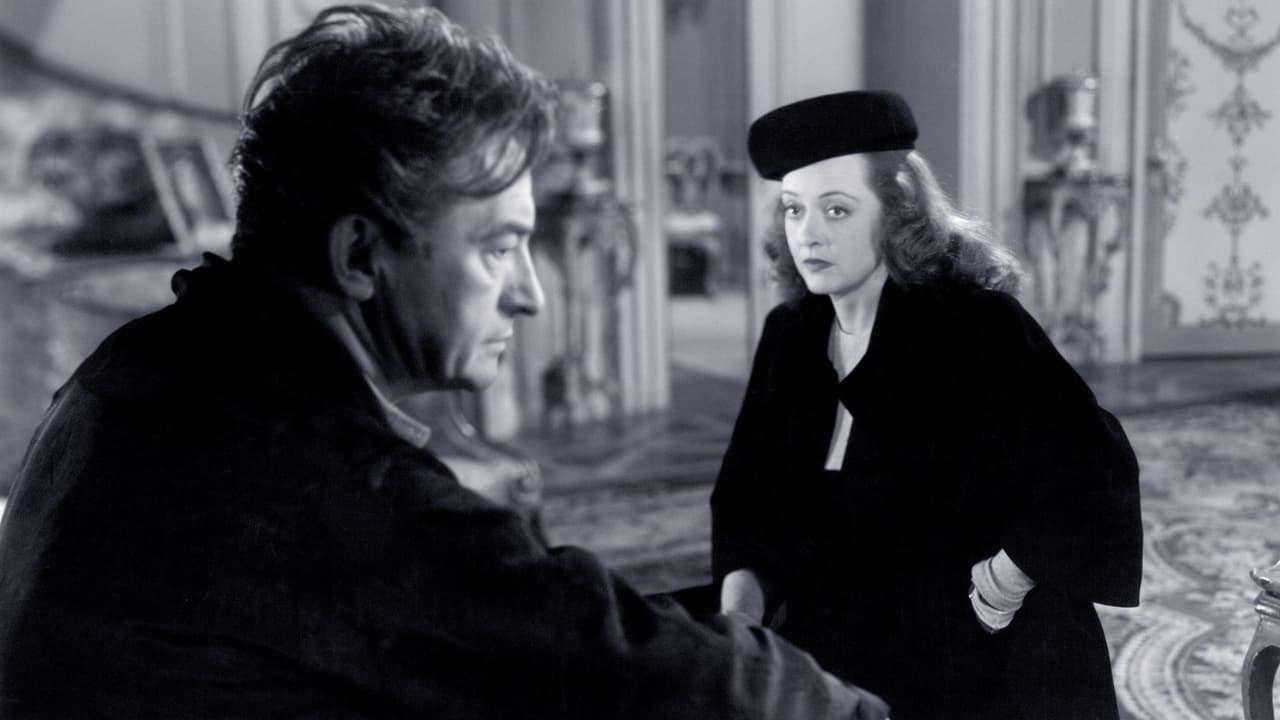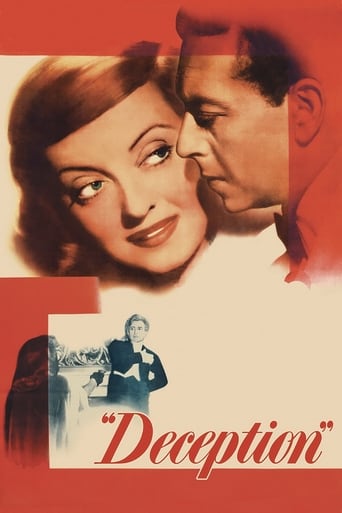

Cellist Karel Novak (Paul Henreid) plays to an adoring American college crowd. Christine Radcliffe (Bette Davis) is overjoyed to find him after assuming him killed during the war. Christine claims to be a struggling musician but he is suspicious of her expensive art and furs. She finally reveals that she had taken in rich pupils. She rushes to get married. Rich famed composer Alexander Hollenius (Claude Rains) surprises her at their reception. He seems to be jealous.This really stretches out the reveal and it's not that big of a reveal. It's melodramatic and Bette Davis pushes very hard. The tension is not that high. I would have loved a more shocking reveal and more heat from Henreid. He is a tall stiff and lacks emotional explosiveness compared to the other two leads. His romantic chemistry with Bette is limited. The movie is a little broad which keeps it from being that compelling.
... View MoreWatching this for the first time in 2015 the first thought that springs to mind is the rivalry between Davis and Crawford, both, in 1946, stars at Warners; what fascinates is this; was the rivalry so intense that BOTH had to co-star opposite an actor playing an outstanding classical musician - Crawford with violinist Garfield in Humoresque, and Davis with cellist Henried in this, Deception? Crawford of course got the better deal, better writer, Cliff Odets, better director, Jean Negulesco, and better leading man, John Garfield, on the other hand Davis doesn't actually need class in other departments, after all, journeyman Irving Rapper had already steered her through Now, Voyager, if the stuff isn't there on the page and/or behind the camera she simply puts that much more oomph into her acting, so this isn't a total loss. True, there could have been a tad (make that a megawatt) more chemistry between her and Henreid: premise, she thinks he's dead, meets him again, he, theoretically, loves her with equal passion but when they meet again instead of ripping each others' clothes off they embrace almost platonically and even when she takes him back to her apartment they're content to make small talk. But this IS Davis and a Claude Rains on top form which means it's a winner.
... View MoreI was so looking forward to this one but when I was finished I was glad it was over.A former European Cello Player finally comes to America after the war. His old girlfriend sees his name in a recital advertisement and she goes and sees if it's actually him...it is.They reminisce a bit and catch up on how he'd been in a prison camp for a while. They go back to her place and he notices for a girl who says she's broke or doesn't have much money she sure has a lot of nice things. She tells him she teaches students who give her these things instead of money but he is suspicious. He trusts her, barely, then they immediately get married. After this, she basically lies through her teeth the rest of the film. That's it. For the "Deception"...read below.The real Deception in this film is that she's a "kept" women of a famous composer. She still loves her old flame from back when and they decide to get married and this displeases her Sugar Daddy. He proceeds to do everything to pull the strings in her life to prevent him from telling her new husband what she really is. Bette Davis had a run of these films in the 40's but this one is not on the top of her best list. She has great chemistry with Claude Rains with the films they did and in this...it's no different. This is Claude Rains film though folks. Plain and simple. Bette Davis is good like she always is but Claude Rains over the topness is just that...over-the-top. He pokes and prods her throughout and she can do nothing about it. He's a composer genius and he thinks that's enough to do whatever he wants...whenever he wants and he does this...with flare. Paul Henreid is wasted in this. He has done so many other better films. He's just nothing special in this.I won't spill on the ending but it's a good one. This is not even remotely close to my favorite Bette Davis film and for good reason. It's nothing to write home about imo. For a title like Deception I expected a lot more but got a loss less. It comes down to this...girl finds long lost love...they marry...she's a kept women...her sugar daddy lover is not pleased at her marriage...she lies and prevents her new husband from finding out...pretty good ending. (Fin)
... View MoreAfter the mutual collaboration with the director Irving Rapper on NOW VOYAGER, the great trio of superb performers, Bette Davis, Claude Rains and Paul Henreid appeared again in DECEPTION – a rather simple, even soap opera-like story ornamented with high-toned classical music setting (the film begins and ends with a concert). The protagonists are all musicians whose lives may be more complicated than one foresees...yet, there is something far more important that you also cannot see in advance: the miracle of silver screen's power to communicate ideas in a tremendously vibrant manner. After seeing it, I admit that it has been one of the truly rare surprises for me in the film-viewing experience – a superb movie with practically three people within the 'scheme' of the plot. Their intercourse, though dated at certain moments, kept me in my chair delighted and thrilled for almost two hours.DECEPTION is clearly a Bette Davis vehicle. Although vehicles may sometimes fail a test of time, this movie is a pure exception thanks to the First Lady of the American Screen as she was often referred to. In her last days at her home studio, Ms Davis does not only manifest perfectionist acting through her world acclaimed amazing eyes but she also plays with all her heart making her character a vibrant depiction of the drama and tension it evokes. She is no longer an innocent girlish actress but a woman of thirty eight, a woman with certain past. Though, what past is it here? Hard memories, dreams unfulfilled, absorbing secrets that are bound to be revealed sooner or later, constant attempts to make herself look decent – she is Christine Radcliffe, a truly troubled figure whose recent decisions have made her life as complicated as she could not imagine before in the darkest nightmares. Her scheme between two men and the dual behavior she depicts supply the plot with involving labyrinth of script and signals. Her moments develop with intense emotions and striving attempts to end it all well. Does she manage? One of her best moments is the wedding when two men meet for the first time and Christine plays Beethoven's Sonata Appassionata (originally played by Shura Cherkassky). The finale, which is influenced by the requirements of the Production Code in its heyday (the mid 1940s), is also captured thanks to the creative ideas of the great acting potential that Bette Davis had. Her face combines riddle with certainty, hesitation with decisiveness and she primarily makes DECEPTION an overwhelming psychological melodrama from the start to the end.Her portrayal would not be that great if it were not for the fruitful contribution of others, particularly her co-stars and....the cinematographer Ernest Haller. It is useful to watch the film for the second time with the disc commentator Foster Hirsch on who highlights certain characteristics that prove the great creativity of Haller's cinematography and Bette's cooperation with the camera. Just to mention her hand gestures, close-ups and meaningful signals of duality that highlight the undertones of the plot. Seemingly, the greatest achievement of sublime cinematography is most memorably manifested in two atmospheric scenes: Christine and Karel's chat at the window filled with drops of falling rain and the moment she murders Alex on the stairs. These are milestones of visuals in DECEPTION. Consider the haunting shadows on the walls, the static camera, music and close-ups when the feelings grow in tension. There are also dreamlike shots of Hollenius's mansion. A great credit to cinematographer Ernest Haller! The music score by Erich Wolfgang Korngold also constitutes a significant factor as far as the undertone and the atmosphere are concerned. However, it would be a highly condensed view to claim that it is Bette Davis who dominates the screen. Her two male co-stars also do splendid jobs and, although both Claude Rains and Paul Henreid portray rather peculiar, obstinate artistic personalities, they still address the European viewer as intensely and effectively as they did in 1946. (more European than American) Why? There are two building blocks of their psyches: both have some difficult memories from the past (PAST...what a 'European' word) and ... both aim at successful career at classical music. Is it jealousy, rivalry? Not merely...it is far more... Also, both are a little neurotic figures who reveal their nerves in splendid acting achievements. While Paul Henreid as Karel has his moments of jealousy and suspicion being depicted (which is also expected from him in the storyline) and is pretty sympathetic even if his moments of rage are sometimes disruptive, Claude Rains gives a fabulous performance as Alex Hollenius. A man who does as he pleases, who is devilishly afraid of one thing...death. He is perceived by Karel as 'egomaniac', 'dictator' (mind you that many terms are rather filled with the European taste, too). He feels extremely comfortable in the role of a petty, cruel and vain man. We can feel the essence of flawless commitment that he put in his work (consider the moment he appears at the wedding). But the climax of all is the scene at the restaurant. Many describe it as a Claude Rains scene and the best scene of the movie...indeed, a must see for all who dream of finding a masterpiece of acting. Foster Hirsch nicely puts it that he 'misbehaves as an old fashioned neurotic' and Glenn Erickson accurately describes Hollenius as the man who 'delights in manipulating people like chess pieces.' But I would add that he captures the entire, even the subconscious attention of a viewer. Simply superb! A timeless performance!Except for the finale which appears to be hardly believable as a purely 'artificial' outcome of the Production Code, DECEPTION is an enjoyable, fascinating film that accurately manifests a sentence derived from what Bette Davis's character says: 'Everything passes but acting' In spite of its 'old age' and 'dated technology' the perfectionist acting emerges and rivets viewers who have hardly been so close to the performers elsewhere.
... View More